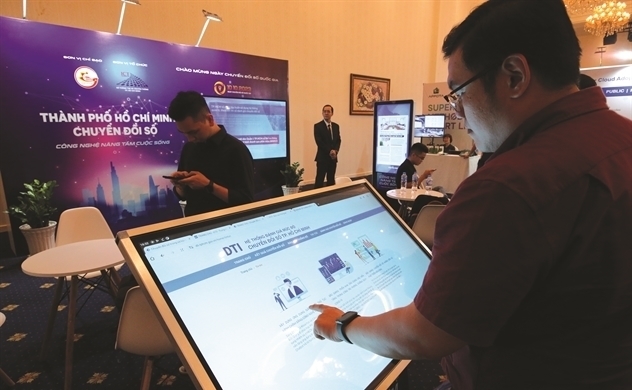Hunt for unicorns from the data gold mine

Vietnam's digital economy is a growing trend, with the country aiming to account for 20% of GDP by 2025 and 30% by 2030. This growth is driven by the increasing use of the internet.
In 2022, Insider Intelligence reported that the number of smartphone users in Vietnam will reach 62.8 million people, an increase of 3.6% from the previous year and accounting for 96% of internet users nationwide.
By 2026, this figure is expected to reach 67.3 million people, a 1.7% increase from the previous year and accounting for about 96.9% of internet users.
The 2022 e-Conomy SEA report by Google, Temasek, and Bain & Company forecasts that Vietnam will be the country with the strongest growing digital economy in the period 2022-2025 among six countries, with GMV (gross merchandise value) increasing by 31% from 23 billion USD in 2022 to 49 billion USD in 2025.
Ho Chi Minh City aims to achieve a digital economy ratio of 25% by 2025 and 40% by 2030, 5-10% higher than the national target to continue being the country's economic leader.
To achieve this goal, Vietnam needs to promote effective exploitation of data. The "National Digital Data Year" theme focuses on development of open data, database development, and promotion of the use of digital platforms for uniform use nationwide or within each locality.
The National Digital Transformation Agency aims to review, amend, supplement, and systematize legal documents on digital data, enabling the creation of unicorn businesses powered by digital data.
However, 71% of banks admitted that data in their systems is not shared with customers, meaning data is fragmented everywhere and not centralized. Organizations must collect and clean data centrally and invest heavily in data structures, improve storage capabilities, and move to the cloud to ensure centralized storage for optimization and operationalization.
The current situation of the banking industry shows that, like many developed digital economies, the speed of their spread across industries is different, with some industries responding slowly to the digital economy.
Retail e-commerce, transportation, medical care, education, entertainment, and finance are still the leading industries reflecting the development of the digital economy in Vietnam.
Mr. Thuong, a driver in Vietnam, struggles to operate independently due to the high fees associated with owning customers' daily traffic data. The digital economy relies on data collection, analysis, and customization to create personalized experiences for users.
Leading internet companies like Google, Amazon, Facebook, and Apple, as well as China's BATX (Baidu, Alibaba, Tencent, and Xiaomi), are leveraging data analytics beyond advertising to refine products for potential customers.
Traditional businesses, such as SF Express and China Merchants Bank, also use data analytics to improve their operations. For example, SF Express uses operational data from 300,000 courier employees and more than 23,000 external stores to provide detailed reports for commercial enterprises.
Meanwhile, China Merchants Bank uses data on transactions and credit history combined with statistical models to determine financial capacity and loan amount for applicants, reducing loan application appraisal time from 3 days to 1 minute.
In Vietnam, retail businesses have adopted strategies to ensure multi-channel customer service, cooperating with various e-commerce platforms like GrabMart.
These platforms cater to different customer preferences and product selection habits. In Southeast Asia, leading companies like the US or China have not yet formed, but separate data oases such as mobility, social networking applications, e-commerce, and TikTok have emerged.
Most multinational companies in Vietnam do not publish data, making statistics difficult. However, it is expected that these companies will continue expanding into other fields to collect data, similar to American and Chinese companies in the near future.
Expanding into other areas allows internet companies to hold more data on user behavior, providing a comprehensive perspective on them, accelerating the speed of attracting users for new products and services and the ability to commercialize related products.
The Vietnamese market shares similarities with the US and China 10 years ago, when technology platforms began expanding user data. Facebook, Google, and Zalo launched short video features to serve users before the rise of TikTok, and Shopee integrated Now, a food delivery platform, into its e-commerce ecosystem to "observe" shopping habits in Vietnam.
Digital transformation is a critical process that requires businesses to effectively implement technology and data strategies. However, many businesses still lack ways to effectively utilize this resource, leading to failures and little value creation.
In Vietnam, the Personal Data Protection Law (GDPR) sets strict regulations and requirements regarding the collection, storage, and use of personal data, requiring companies to adhere to stricter rules in data management and ensure users have control over their personal information.
To make the best use of data, businesses must focus on building their own data and develop a policy to cooperate with partners to add more data in accordance with regulations to improve quality and high business efficiency. Investing and doing it carefully will be more advantageous than using unofficial data sources from third parties.
Traditional Chinese businesses have been methodically utilizing data to adapt to the changing market share of internet companies. For example, Jahwa, a major beauty care brand, has partnered with Alibaba's consumer behavior and transaction data to develop products, shortened product marketing time, and expanded its product portfolio.
China Guanfa commercial bank has expanded its branches and locations based on the Baidu Map service, which processed more than 10 billion pieces of location data every day.
However, partnerships with technology companies may not be sustainable as they may blur the lines between traditional and digital companies over time. Partnerships must develop new customers by providing suitable "follow-on" products.
Guardian Vietnam, despite cooperating with platforms, has built its own sales system on websites and applications, with 2 million members and over 200,000 application downloads, helping the return rate reach 80%.
To optimize business operations, businesses need to synthesize data in one place and have a more comprehensive view of customers and business activities. New data can be used to optimize inventory management, forecasting demand and supply, optimizing costs, human resources, or conducting individual marketing strategies tailored to each customer.
Building a data analysis system requires an average of 3–4 personnel, initial system investment costs, and takes about 3-6 months to deploy.

 TIẾNG VIỆT
TIẾNG VIỆT 
_1120686.png)

















